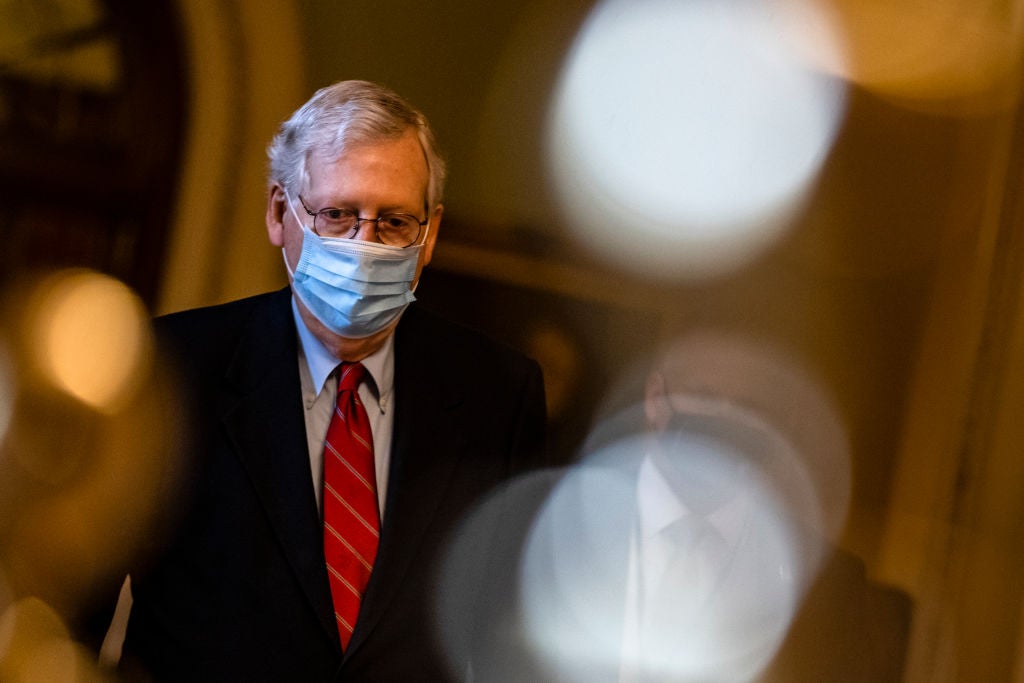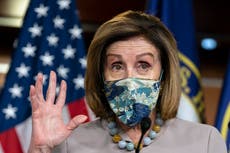Mitch McConnell can’t rewrite the record on Covid negotiations
And Chuck Schumer isn’t letting him, writes US political correspondent Griffin Connolly


As Congress prepared to vote on an historic $900bn coronavirus stimulus package on Monday, Senate Majority Leader Mitch McConnell took to the podium to rewrite the history on how that deal took shape.
“Senate Republicans have been trying since July — July — to get more targeted bipartisan relief into the hands of the American people,” he said.
The Kentucky Republican pointed to a $1trn bill he and the GOP majority first offered this summer that included a second round of stimulus checks, reauthorisation of key lending programmes for small- and medium-sized businesses, and billions of additional dollars to boost testing to help get children back to in-person schooling for the fall.
“Democrats said no,” Mr McConnell said. “They said they'd block anything short of their multi-trillion-dollar, left-wing wish list.”
In September, Senate Democrats did block that bill, which failed to clear the chamber’s 60-vote threshold for legislation to continue towards passage.
And one month later, in October, they voted down an even narrower one with a price tag of $500bn.
But Mr McConnell’s account of the nine-month gap between the $2.2trn CARES Act from March and the $900bn relief package set to become law later this week — the two most expensive pieces of legislation in US history — is laughably incomplete, a gross mischaracterisation of what actually happened.
First, Democrats have never objected to any of the provisions Mr McConnell listed in his Senate floor speech on Monday — stimulus checks, an extension of federal unemployment aid, funds for testing and, now, vaccine distribution.
In fact, if Americans are upset that their stimulus checks from the new bill are only $600 this time around instead of $1,200, or if they’re disappointed that the weekly federal supplement for their unemployment checks are only $300 instead of $600 as in the CARES Act, they should know it’s Republicans who insisted on those reductions in the last several weeks of negotiations.
And to be clear, millions of Americans who are inclined to vote for Republicans are fine with those programmatic cuts since they shave hundreds of billions of dollars off the package’s topline price tag. That means less federal debt, which was already at more than $23trn as of February 2020.
Three other things Mr McConnell didn’t mention:
- One, his months-long insistence that any new Covid deal include a shield for businesses, health care providers, and school systems from liability lawsuits stemming from exposure to the virus, a key sticking point preventing a bipartisan accord;
- two, the widespread and very public fracture within the Senate GOP on the scope of legislation, competing intra-party motivations that rendered bipartisan cooperation before the 2020 election impossible;
- and, three, the fact that he intentionally sidelined himself from any bipartisan negotiations from March all the way through November’s elections, even calling for a “pause” in any further Covid legislation for most of the spring and summer after passing the CARES Act.
As Senate Minority Leader Chuck Schumer correctly pointed out on Monday, each GOP bill prior to Monday’s bipartisan agreement included the “poison pill” of liability protections and did not meet Democrats’ demands.
Neither of the Senate GOP’s bills had any input from Senate Democrats, just as the various iterations of House Democrats’ Covid package from the fall — ranging from as much as $3trn in May to $2.2trn in a final offer in October — did not include any say from the House GOP minority.
The difference is that Mr McConnell still insists on using his previous partisan offerings — which he knew would never pass muster with his Democratic colleagues — as a political cudgel for the all-important Blame Game, even though the unwritten rule during serious congressional negotiations is that you don’t directly trash the other side when a deal is on the proverbial one yard line.
Mr Schumer, exasperated with Mr McConnell’s indefatigably partisan rhetoric over the last week, let his frustrations boil over on the Senate floor on Monday.
“Every day, it seems for the past week or so I come to the floor, ready to talk about the merits of bipartisan legislation we've been drafting, not wanting to be critical at all. And then I listen to the Republican leader. The leader’s remarks just about every day this week as he opens the Senate have been so nastily partisan and in so many ways false that I have no choice but to correct the record as the Democratic leader,” Mr Schumer said.
The New York Democrat then proceeded to list off all the ways in which the $900bn bipartisan bill differed from Mr McConnell’s $500bn bill from October, which included no stimulus checks, no federal unemployment supplements, no increases in the food stamp benefit, and no money for airline and mass transit operators.
Monday’s package has billions of dollars — in some cases hundreds of billions of dollars — for each of those programmes.
“The two bills are nothing alike,” Mr Schumer said.
It’s also true that Monday’s bill bears little resemblance to any of the Democrats’ previous bills, which included the poison pills for the GOP of hundreds of billions of dollars in aid to state and local governments, measures that would further decriminalise marijuana, and billions of dollars in spending on tertiary infrastructure projects.
But here’s the thing: no serious Democrat is pretending it does.
Join our commenting forum
Join thought-provoking conversations, follow other Independent readers and see their replies
Comments




Bookmark popover
Removed from bookmarks